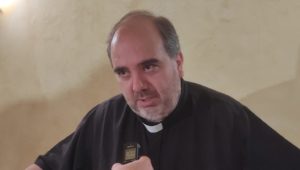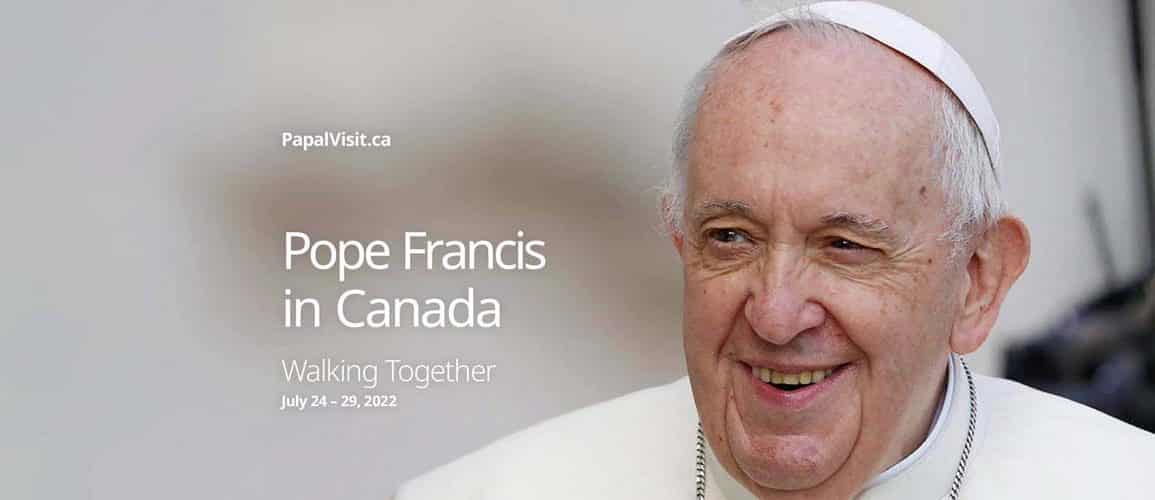Four stops (Edmonton, Maskwacis, Quebec and Iqaluit), a pilgrimage and, above all, meetings with indigenous communities. Pope Francis, after being forced to postpone his trip to the Congo and South Sudan, has not wanted to give up his visit to Canada, from July 24 to 30. What reception will you find? What will be the main themes? Father Antonio Hofmeister, a Brazilian priest from Porto Alegre, ordained in 2002, who after working in the Amazon in 2011 moved to Rome to study, spoke about this at an informal meeting with Vaticanists organized by the Iscom Association. Then, from 2013 to 2016, he was the pastor in Edmonton of a Portuguese immigrant church.
Canada, a multicultural country
“Canada is a country that considers itself multicultural,” she explained. There are “so many migrants”. In Edmonton, masses are celebrated in 13 different languages (Hungarian, Spanish, Italian, Portuguese, German, French, etc.). And there is a specific parish for the native peoples: “Sacred Heart of the Native Peoples”.

Native populance
The priest outlined the situation of the indigenous peoples, with whom the Pope will meet on July 25 in Maskwacis. It is a town south of Edmonton where the Sisters of Merciful Jesus, of Santa Faustina, work, and where the presence of native peoples is massive. There are three groups: “Those of the ‘first nations’, which group together different peoples; the mestizos, who derive from the union of the first French colonizers with the native peoples, present above all in the eastern part of Canada; and the Inuit, or rather the Eskimos, who live in the northernmost area”. In the last stage, Francisco will travel to Iqaluit, which is located on the edge of the Arctic Circle, in an area that is difficult to access. This says a lot, in my opinion -says Fr. Antonio-, of what Jesus’ mandate to “go throughout the world” is.
The request for forgiveness
Among the topics of the trip is, without a doubt, that going to the peripheries of the world, as well as aspects related to the care of creation, for example the problem of melting ice. “But above all”, explains Father Antonio, “it is a journey to recognize the role played by some people from the Church in the issue of boarding schools. To ask God for forgiveness, to show solidarity with the people who are there. In the groups that came to Rome between March and April, there are people who have lived in boarding schools”.
Residential schools in Canada
What is it about? It was a Canadian government project initiated in the late 19th and early 20th centuries. The government sought the cooperation of other institutions (such as the Catholic Church and the United Reformed Church). Some schools were state schools. The basic idea was to integrate indigenous peoples into Canadian society. However, “not by preserving their culture, but by trying to get them to take on a Western culture.”
“The children were separated from their families and put in these boarding schools, thus losing all contact with their origins and educating them in a culture brought from Europe. Many, even today, give thanks for the education they received”, explains Don Antonio, “but many others refer to these actions as ‘cultural genocide’. What was the role of the Church? The Government did not have sufficient means for all these people and asked for help.” The scandal erupted when unidentified children’s graves were discovered next to boarding schools in British Columbia and other areas.
A still open wound
“It must be said that at that time infant mortality, also due to the difficult environmental conditions and the distance from hospitals, was very high. But this does not justify that these tombs remain nameless, that families continue without knowing the fate of their children. Neither is the imposition of a different worldview and spirituality. For the natives, a child is not only the son of his parents, in a certain sense he belongs to the community, understood as a large family. This alienation was the dramatic aspect of the system.
The hostility of the government of Canada
However, the attitude of the Trudeau government seems rather hostile towards the Church, or at least not very cooperative, “the Canadian government has provided for reparations, the current laws protect indigenous reserves. For its part, the Canadian Church has also promised to compensate financially, it has taken its own measures. There is a program, ‘Truth and Reconciliation’, prior to the discovery of the graves, for which the Church assumes its share of responsibility and not only remembers the truth of the past, but also seeks reconciliation, walking together. The Church does it with a lot of effort and perhaps, it is my personal opinion, the government does not like it”.
In fact, no official statement of apology from the government is remembered. It should also be remembered that when the last Catholic boarding school was closed in the 1970s (while some of the government schools remained open), the prime minister was the father of the current prime minister.
“From what I have heard,” says Fr. Hofmeister, “there was a very positive resonance in the Canadian media after the Pope’s audiences with the three native groups and the general audience with everyone. His request for forgiveness was greatly appreciated. Before, there were general accusations against the Church and not against individuals who did evil: priests are pederasts, the Pope is the antichrist, he must resign, etc. Some churches were vandalized after the discovery of the tombs. A historic early 20th century stave church in Canada burned to the ground.”
The fact that the Pope is going to Canada despite his health problems also has a positive impact. As were the words of the Holy Father to the bishops at the end of the audience with the natives, in which he encouraged them: you are on the right path, if it is necessary to humble yourself, do it, it is what the Master did. We must make years of tears, this is our path.
The elders
And with the natives, another point of understanding with the Holy Father is the elderly: “The Pope is highly appreciating them, even with the catechesis during the general audience. For the natives they are a symbol of wisdom, of transmission of knowledge: they understand each other very well”.
Expected Results
What results can be expected from this visit to Canada? Has there been a collapse of the faithful after the crisis in boarding schools? “I hope it will be a great success,” replies Father Antonio. “Of course, there will always be voices against, but obviously I think that the Pope will not arouse sympathy. The fact that he is going to Canada despite the difficulties related to his health will make people realize that the Pope loves him. In Quebec, where there is a majority of Catholics, there has been a decline in the faithful, but not related to the issue of schools. Rather, to the secularization that has affected the entire West since the post-conciliar period. In any case, both in Edmonton and in Quebec, the tickets for the masses were sold out in a matter of minutes”, concludes Father Hofmeister.










